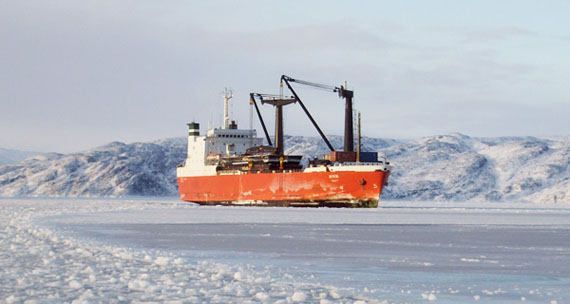Inuit Nunangat sealift shipper on board with fossil-fuel phase-out
Leaders of largest global shipping companies call for end-date on building fossil-fuel only ships

The head of Nunavik Eastern Arctic Shipping Inc. concurs with leaders of some of the world’s largest ship operators in calling for a phasing out of building new ships powered by fossil fuels.
“Decarbonization is top of mind for all ship operators around the world,” said NEAS president Daniel Dagenais in an interview.
NEAS provides sealift shipping through Nunavut and Nunavik. Its majority owner is Makivvik Corp.
The 28th annual United Nations global climate summit, known as COP28, is being held in Dubai until Dec. 12.
At the summit, chief executive officers for the global marine shipping companies MSC, Maersk, CMA CGM, Hapag-Lloyd and Wallenius Wilhelmsen called for an end-date in the building of ships powered only by fossil fuels.
NEAS is looking more into the use of renewable energy, Dagenais said, whereas this issue used to be a secondary consideration.
“Now it’s top of mind for us, because our assets are in operation for 15 to 20 years and sometimes more,” he said.
For NEAS, this requires technology that can function reliably in Arctic conditions.
Since the Arctic’s cold temperature would be a drain on a ship’s electric power, NEAS is looking into green fuels such as ethanol, ammonia or hydrogen, Dagenais said.
To ensure communities are properly served, NEAS will gradually make the shift toward renewable energy.
“The last thing we want to do is commit to this transition [too] early and put in jeopardy the service we provide to isolated communities,” Dagenais said, adding he does not want to see a situation where an NEAS ship cannot function because of a technology or fuel problem.
“There’s very little room for error here,” he said.
Environmental non-profit group Clean Arctic Alliance sent out a news release Dec. 7 saying the group took notice of the joint statement “with interest” and pushed the shipping companies to take it one step further by adding their voice to a years-old call to regulate black carbon emissions.
Black carbon is produced by burning heavy fuel oil — the cheapest and dirtiest oil leftover after the oil refining process. Heavy fuel oil is commonly used by ships around the world, according to Clean Arctic Alliance.
The alliance’s lead adviser, Sian Prior, said the first step is for ships operating in the Arctic to move from heavy-oil fuels to lighter fuels to reduce their black carbon emissions.
“Then … black carbon compliance thresholds [need] to be established that can be tightened over time to eliminate black carbon emissions,” he said in the news release.
“Continuing to use heavy residual fuels or moving to alternative methane-based gas fuels is not acceptable.”
Other groups such as the Inuit Circumpolar Council have also called for the removal of black carbon in Arctic waters. Until the end of the year, the council is a provisional consultative member in the United Nations International Maritime Organization, which is responsible for international shipping regulations.
Inuit Circumpolar Council Canada president Lisa Koperqualuk is in the United Arab Emirates for COP 28 was not available for an interview.
Nunatsiaq News is the newspaper of record for Nunavut and the Nunavik territory of Quebec. It has been published since 1973 and reaches 50,000 readers in 39 eastern Arctic communities each week through its website and weekly e-editions. Its editorial team offers credible, in-depth, award-winning journalism, drawing readers from northern and southern Canada and around the world. Nunatsiaq News is owned by Nortext Publishing Corp., which maintains offices in Iqaluit and Ottawa.